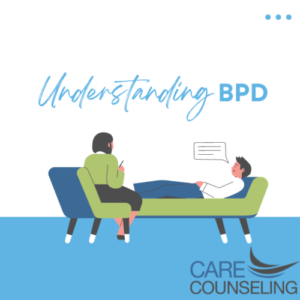 BPD aka “Borderline-Personality-Disorder”
BPD aka “Borderline-Personality-Disorder”
Do I have BPD if I struggle with feelings of abandonment, especially considering I experienced loss or relational trauma?
What if I don’t get along well with my family and there is conflict in my friend group?
How about binging, online shopping, or hooking up with someone when I am lonely or bored?
I don’t feel good about myself and have mood swings. Sometimes I engage in self-harm or have thoughts of suicide.
While these are all features that may be present in someone with a diagnosis of borderline personality disorder (BPD) these may also be present in other areas such as adjustment difficulties, trauma such as post-traumatic-stress-disorder (PTSD), impulsivity with ADHD, binge eating disorder, difficulties with self-esteem or suicidal thoughts with depression, manic and depressive mood swings as part of bipolar-disorder to name a few. It is also possible to have more than one area present, such as a trauma history and struggles with regulating mood.
One thing that distinguishes borderline personality disorder from the other areas is that BPD is a personality-disorder. That means that there are rigid and unhealthy patterns that impact areas of functioning. For BPD, that pervasive pattern is in interpersonal relationships, self-images, affects, and impulsivity. These symptoms must be present beginning in early adulthood and within various contexts.
Other signs or symptoms of borderline-personality-disorder as listed by the National Institute of Mental Health may include:
- Efforts to avoid real or perceived abandonment, such as plunging headfirst into relationships—or ending them just as quickly.
- A pattern of intense and unstable relationships with family, friends, and loved ones.
- A distorted and unstable self-image or sense of self.
- Impulsive and often dangerous behaviors, such as spending sprees, unsafe sex, substance abuse, reckless driving, and binge eating. Please note: If these behaviors happen mostly during times of elevated mood or energy, they may be symptoms of a mood disorder and not borderline personality disorder.
- Self-harming behavior, such as cutting.
- Recurring thoughts of suicidal behaviors or threats.
- Intense and highly variable moods, with episodes lasting from a few hours to a few days.
- Chronic feelings of emptiness.
- Inappropriate, intense anger or problems controlling anger.
- Feelings of dissociation, such as feeling cut off from oneself, observing oneself from outside one’s body, or feelings of unreality.
Having an evaluation by a mental-health specialist is a great place to start discussing your symptoms and how they impact you and your relationships. If you have concerns about personality patterns, having a comprehensive psychological-evaluation by a licensed psychologist can help clarify a diagnosis. Oftentimes, more intensive support may be needed until symptoms are stabilized such as an intensive-outpatient-program, residential-inpatient, or specialized approaches such as dialectical-behavior-therapy.
There are many factors that impact one’s mental health such as genetic predisposition, social, cultural, and environmental factors, and trauma history. Our personality is an important part of one’s identity, therefore what we believe about ourselves and what identities we attach are powerful. Please be mindful of how you talk about yourself and others with certain diagnoses such as BPD to not perpetuate stigmatizing language that leads to unfair bias and judgment. This includes family, friends, colleagues, and healthcare professionals.
Here is an awesome resource source: emergency resources and support, “accurate and honest websites with information on BPD”, books for family members regarding BPD/ emotional dysregulation, resources to find treatment, and nonprofit resources that promote research, advocacy, and education. https://www.borderlinepersonalitydisorder.org/list-of-recommended-bpd-resources/
Written By: Charlotte Johnson, MA, LPCC
We’re Here to help
Our wellness experts will be happy to take care of you. You can CLICK HERE to schedule an appointment now or call (612)223-8898.
Meet Clinicians
We’re united by our commitment to providing effective, relevant, and innovative mental health support at all stages of your journey. Click Here to find a therapist or find out more about who we are, where we come from, and how we live out CARE’s mission every day.
The professionals at CARE are actively collecting and creating resources to help with what you need and address frequently asked questions. We’re Here for You.



